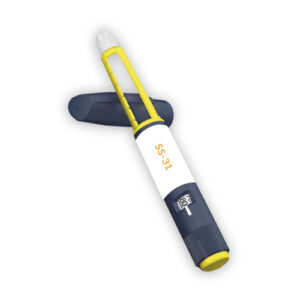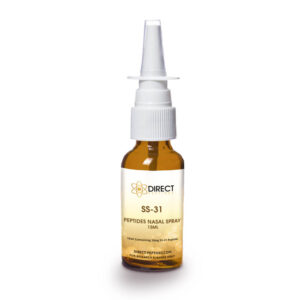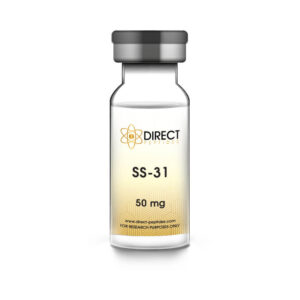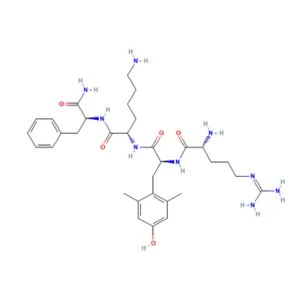Buy SS-31 Peptide
Buy SS-31 peptide, a synthetic compound designed to target and protect mitochondria, offering potential benefits such as reducing oxidative stress, improving cellular energy production, and mitigating conditions linked to mitochondrial dysfunction.
Shop our Full Range of SS-31 Peptides
-
Sale!

SS-31 Pre-Mixed Pen 25mg Peptide
£146.33 – £395.09Price range: £146.33 through £395.09 This product has multiple variants. The options may be chosen on the product page -
Sale!

SS-31 Nasal Spray
£151.75 – £298.50Price range: £151.75 through £298.50 This product has multiple variants. The options may be chosen on the product page -
Sale!

SS-31 Peptide Vial
£112.50 – £296.48Price range: £112.50 through £296.48 This product has multiple variants. The options may be chosen on the product page
What is SS-31 Peptide?
SS-31 peptide, also known as elamipretide, is a tetrapeptide consisting of four amino acids. Its special structure helps it enter cells easily and directly target mitochondria. It works by binding to cardiolipin, a lipid found only in the inner mitochondrial membrane. By stabilizing cardiolipin and reducing mitochondrial dysfunction, SS-31 improves mitochondrial function and lowers the harmful effects of reactive oxygen species (ROS).
This peptide has been widely studied for its potential to treat conditions like neurodegenerative diseases, cardiovascular issues, and age-related disorders. Research shows that SS-31 helps improve mitochondrial membrane potential and ATP production, making it a promising candidate for therapies focused on maintaining cellular health. Its unique features make it an important topic in mitochondrial medicine.
SS-31 Mechanism Of Action
The SS-31 peptide works by specifically targeting mitochondria and interacting with their inner membranes. It is a small, cell-permeable peptide designed to efficiently penetrate mitochondrial membranes. Once inside, it binds to cardiolipin, a unique phospholipid essential for maintaining the structure and function of mitochondria.
By stabilizing cardiolipin, SS-31 protects the inner mitochondrial membrane from oxidative damage caused by reactive oxygen species (ROS). This reduces oxidative stress, prevents lipid peroxidation, and helps maintain the integrity of mitochondrial membranes.
SS-31 also improves the efficiency of the electron transport chain, boosting ATP production and overall mitochondrial function. These combined effects highlight its potential as a therapeutic option for treating mitochondrial dysfunction and related diseases.

Structure of SS-31
Sequence: H-D-Arg-Tyr(2,6-diMe)-Lys-Phe-NH2
Molecular Formula: C32H49N9O5
Molecular Weight: 639.8 g/mol
PubChem CID: 11764719
What Are The Research Benefits of SS-31?
Oxidative Stress Reduction: The peptide plays a vital role in reducing oxidative stress, a condition caused by an imbalance between free radicals and antioxidants in the body. By directly binding to cardiolipin in the inner mitochondrial membrane, the peptide stabilises mitochondrial function, minimises reactive oxygen species (ROS) production, and prevents cellular damage [1].
Mitochondrial Dysfunction: This is a hallmark of numerous chronic diseases and age-related conditions. SS-31 restores mitochondrial bioenergetics by improving ATP production efficiency and reducing mitochondrial swelling and membrane depolarisation. This, in turn, enhances cellular energy levels and overall mitochondrial health [2].
Kidney Disease: Clinical research indicates that it holds potential in addressing kidney-related conditions, such as acute kidney injury and chronic kidney disease (CKD) [3]. The peptide aids in protecting renal cells from oxidative stress, improving mitochondrial function, and enhancing ATP production. Swift recovery of ATP may help prevent cell death, strengthen tubular barrier function, and reduce renal dysfunction. These effects may slow the progression of kidney disease and improve overall renal health.
Ischemia leads to organ damage, such as acute kidney injury (AKI), by depleting ATP, with mitochondrial damage delaying its recovery. The mitochondria-targeted compound may accelerate ATP recovery post-ischemia by binding to cardiolipin, which supports cristae structure essential for ATP synthesis [4]. The peptide appears to protect mitochondrial cristae membranes, reduce mitochondrial damage, and suppress harmful processes like cytochrome C peroxidase activity. In murine models, it preserved mitochondrial function, swift ATP recovery, reduced apoptosis, and improved kidney function following ischemia, highlighting its potential therapeutic value for AKI.
Neuroprotection: It exhibits significant neuroprotective properties, making it a promising therapy for neurodegenerative diseases like Alzheimer’s and Parkinson’s. By reducing oxidative damage, supporting mitochondrial integrity, and lowering inflammation, the peptide helps maintain neuronal function and protect against cognitive decline. Studies of derivatives, particularly peptides 5f and 5g, have demonstrated superior therapeutic potential, reducing TNF-α levels and enhancing ATP synthesis by over 40% in neuronal cells. Furthermore, it has shown efficacy in murine models of neuronal injury by mitigating oxidative stress, reducing neural apoptosis, and restoring mitochondrial function through mechanisms involving SIRT1 expression and PGC-1α nuclear relocation. These findings underscore it’s potential as a neuroprotective agent for treating neurodegenerative conditions [5].
Metabolic Conditions (e.g., Diabetes): A study explored its beneficial effects on leukocytes in type 2 diabetes models, focusing on oxidative stress, ER stress, and autophagy. T2D models showed higher ROS levels, calcium content, and ER stress markers (GRP78, CHOP). The peptide significantly reduced these levels, suggesting potential protective effects. The treatment also lowered BECN1 gene expression and autophagy-related proteins (Beclin1, LC3 II/I) while restoring p62 protein levels. Additionally, it improved leukocyte-endothelium interactions by decreasing adhesion and increasing rolling velocity. In comparison, SS-20, which lacks antioxidant properties, showed no effects. Researchers concluded that it may offer protective benefits for leukocytes in T2D [6].
Anti-Inflammatory Effects: It exhibits notable anti-inflammatory properties by decreasing inflammatory mediators and reducing oxidative stress-induced inflammation. This makes it a potential therapeutic option for several inflammatory-related conditions and chronic illnesses [7].
Cardioprotection: Heart health greatly benefits from the peptide due to its cardioprotective properties. By reducing oxidative damage to cardiac mitochondria and improving mitochondrial function, it helps prevent ischemia-reperfusion injury and protects against heart failure and other cardiovascular diseases, including mitochondrial myopathy [8].
Tendinopathy: One study explored whether it could improve mitochondrial function in tenocytes from degenerative tendons. The results showed that degenerative tenocytes had mitochondrial dysfunction, including structural issues, lower superoxide dismutase activity, and increased expression of genes related to matrix remodeling and fatty infiltration. Treatment with the peptide improved mitochondrial function, reduced harmful gene expression, and slightly boosted cell viability. These findings suggest that it could help heal tendinopathy by protecting and restoring mitochondrial health [9].
Anti-Aging Potential: Age-related mitochondrial decline is a key contributor to the aging process. It’s ability to restore mitochondrial function, reduce oxidative stress, and improve overall cellular energy production positions it as a potential anti-aging intervention. One study examined its potential anti-aging effects on heart proteins in aged mice. Aging was linked to increased oxidation of protein thiols, shown by higher S-glutathionylation in older mice compared to younger ones. An 8-week peptide treatment largely reversed these oxidative changes and partially restored age-related modifications in heart protein phosphorylation. The findings suggest it may mitigate age-induced changes in heart function by influencing redox and phosphorylation pathways [10].
Buy SS-31 for research use online today!
Buy SS-31 Peptide Vial
Buy SS-31 peptide vial for laboratory research use today. It is supplied as a lyophilized powder in vials containing 10mg or 50mg.
This powdered form ensures stability and longevity, and it is reconstituted with a solvent, such as bacteriostatic water, prior to use.
Buy SS-31 Peptide Nasal Spray
Buy SS-31 nasal spray , available in 15ml and 30ml bottles for laboratory research. The spray format allows efficient, targeted delivery, giving researchers an alternative for studying its potential uses.
Proper handling and storage are key to ensuring stability and reliable results. This product is for research use only and not for human or veterinary use.
Frequently Asked Questions (FAQs) about SS-31
Are there any side effects associated with SS-31?
Preliminary studies suggest that it is generally well-tolerated, with minimal side effects observed. However, more extensive clinical trials are needed to thoroughly evaluate its safety profile.
What conditions can SS-31 potentially treat?
It is being researched for its potential to treat a variety of conditions related to mitochondrial dysfunction, including chronic kidney disease, heart failure, neurodegenerative diseases, and age-related disorders. Current studies have shown promising results in experimental models of these diseases.
Can SS-31 help treat eye conditions?
It shows promise as a treatment for eye conditions caused by oxidative stress, such as diabetic retinopathy and glaucoma. By targeting mitochondria, it helps reduce oxidative damage, preserve retinal integrity, stabilise the blood-retinal barrier, and promote cell survival [11]. In glaucoma, the peptide may protect retinal ganglion cells and slow neurodegeneration. While more clinical studies are needed, it offers a hopeful approach for managing degenerative eye diseases [12].
Is SS-31 peptide legal?
The legal status of the peptide largely depends on its intended use and the regulations of individual countries. Currently, you can buy SS-31 as an investigational compound, it is not yet approved for general therapeutic use. It is predominantly utilised in research settings and clinical trials. Regulatory agencies, such as the FDA in the United States, typically oversee and restrict access to investigational drugs, ensuring they are used strictly for research purposes until they demonstrate safety and efficacy for public use. Therefore, it is essential to check local regulations and stay informed about evolving legal frameworks surrounding it.
Is SS-31 Peptide Safe?
It has shown to be generally well-tolerated in preclinical and early clinical trials, with minimal adverse effects reported. However, as an investigational compound, its full safety profile, long-term effects, and potential toxicity require further study. Caution is advised, and its use should be guided by scientific research.
Buy SS-31 for in vitro testing and in vivo laboratory experimentation from Direct Peptides.
Summary of Research Applications
- Improves mitochondrial function.
- Improves energy via mitochondrial ATP synthesis.
- Reduces inflammatory cytokines.
- Potential treatment for muscle weakness and tendon repair.
- Protects vital organs from damage caused by oxidative stress.
Buy SS-31 Pre-Mixed Pen for laboratory research purposes. Pre-Mixed Cartridge Kits include a cartridge (pre-mixed with your chosen peptide and Bacteriostatic Water), a pen, a carry case, and 3 needle tips. Single Cartridges (1, 2, or 3) come with the pre-mixed cartridge and 3 needle tips but no kit. Save 10% when purchasing 3 cartridges.
SS-31 Peptide Quality Assured
Buy SS-31 peptide with 99% purity from Direct Peptides, perfect for research on mitochondrial medicine, aging, and neurodegenerative diseases.
Our SS-31 peptides are produced to the highest quality standards and rigorously tested by third parties to ensure purity and effectiveness.
We also offer fast shipping and reliable customer service for a seamless experience.
References For Further Reading
[1] Yanjuan Hou, Yonghong Shi, Baosheng Han, Xuqian Liu, Xi Qiao, Yue Qi, and Lihua Wang (2018) The antioxidant peptide SS31 prevents oxidative stress, downregulates CD36 and improves renal function in diabetic nephropathy – Nephrology Dialysis Transplantation, Volume 33, Issue 11, November 2018, Pages 1908–1918.
[2] Matthew D. Campbell, Jicheng Duan f, Ashton T. Samuelson, Matthew J. Gaffrey, et al (2019) Improving mitochondrial function with SS-31 reverses age-related redox stress and improves exercise tolerance in aged mice – Free Radical Biology and Medicine, Volume 134, April 2019, Pages 268-281.
[3] Yuexin Zhu, Manyu Luo, Xue Bai, Jicui Li, et al (2022) SS-31, a Mitochondria-Targeting Peptide, Ameliorates Kidney Disease – Oxidatve Medicine and Cellular Longevity, 2022 Jun 6, Volume 2022, Page 1295509.
[4] Alexander V Birk, Shaoyi Liu, Yi Soong, William Mills, et al (2013) The mitochondrial-targeted compound SS-31 re-energizes ischemic mitochondria by interacting with cardiolipin – Journal of the American Society of Nephrology, 2013 Jul, Volume 24 (Issue 8), Pages 1250-61.
[5] Yihao Zhu, Handong Wang, Jiang Fang, Wei Dai, et al (2018) SS-31 Provides Neuroprotection by Reversing Mitochondrial Dysfunction after Traumatic Brain Injury – Oxidative Medicine & Cellular Longevity, 2018 Aug 27, Volume 2018, Page 4783602.
[6] Yunan Mo, Songyun Deng, Yuhang Ai, Wenchao Li (2024) SS-31 inhibits the inflammatory response by increasing ATG5 and promoting autophagy in lipopolysaccharide-stimulated HepG2 cells – Biochemical & Biophysical Research Communications, 2024 May 28, Volume 710, Page 149887.
[7] Irene Escribano-López, Aranzazu M de Marañon, Francesca Iannantuoni, Sandra López-Domènech, et al (2019) The Mitochondrial Antioxidant SS-31 Modulates Oxidative Stress, Endoplasmic Reticulum Stress, and Autophagy in Type 2 Diabetes – Journal of Clinical Medicine, 2019 Aug 28, Volume 8 (Issue 9), Page 1322.
[8] Dao-Fu Dai, Tony Chen, Hazel Szeto, Madeline Nieves-Cintrón, et al (2013) Mitochondrial targeted antioxidant peptide ameliorates hypertensive cardiomyopathy – Journal of the American College of Cardiology, Volume 58, Issue 1, 28 June 2011, Pages 73-82.
[9] Xueying Zhang, Ying Zhang, Meng Zhang, Yusuke Nakagawa, et al (2022) Evaluation of SS-31 as a Potential Strategy for Tendinopathy Treatment: An In Vitro Model – The American Journal of Sports Medicine, 2022 Aug, Volume 50 (Issue 10), Pages 2805-2816.
[10] Jeremy A Whitson, Miguel Martín-Pérez, Tong Zhang, Matthew J Gaffrey, et al (2021) Elamipretide (SS-31) treatment attenuates age-associated post-translational modifications of heart proteins – GeroScience, 2021 Sep 4, Volume 43 (Issue 5), Pages 2395–2412.
[11] J Huang, X Li, M Li, J Li, W Xiao, W Ma, X Chen, X Liang, S Tang, and Y Luo (2013) Mitochondria-targeted antioxidant peptide SS31 protects the retinas of diabetic rats – Current Molecular Medicine, 2013 Jul, Volume 13 (Issue 6), Pages 935-45.
[12] Yu Pang, Chao Wang, and Ling Yu (2015) Mitochondria-Targeted Antioxidant SS-31 is a Potential Novel Ophthalmic Medication for Neuroprotection in Glaucoma – Medical Hypothesis Discovery & Innovation in Ophthalmology, 2015 Autumn, Volume 4 (Issue 3), Pages 120–126.
Why Choose Direct Peptides ?
Buy SS-31 today from Direct Peptides, your trusted source for high-quality peptides. We offer a wide range of formulations to suit different research needs, including peptide vials in 10mg and 50mg, nasal sprays in 15ml and 30ml bottles, and a 25mg pre-mixed peptide pen. Our goal is to provide researchers with the exact formulations they need for their specific projects.
ALL CONTENT AND PRODUCT INFORMATION AVAILABLE ON THIS WEBSITE IS FOR EDUCATIONAL PURPOSES ONLY.
DISCLAIMER: These products are intended solely as a research chemical only. This classification allows for their use only for research development and laboratory studies. The information available on our Direct Peptides website: https://direct-peptides.com is provided for educational purposes only. These products are not for human or animal use or consumption in any manner. Handling of these products should be limited to suitably qualified professionals. They are not to be classified as a drug, food, cosmetic, or medicinal product and must not be mislabelled or used as such.
Related Posts

How Does Peptide SS-31 Protect the Brain?
Peptide SS-31 shows promise in neuroprotection by stabilizing mitochondrial function and reducing oxidative stress, key factors in brain health. It’s being studied for its potential to combat neurodegenerative diseases like Alzheimer’s and Parkinson’s by improving energy production, protecting neurons, and supporting cognitive function. While currently for research use only, it offers exciting possibilities for addressing age-related cognitive decline.

How Can SS-31 Help Treat Mitochondrial Diseases?
The mitochondria-targeting peptide is designed to combat mitochondrial disorders by stabilizing mitochondrial structure, reducing oxidative stress, and restoring energy production. It holds potential for treating neurodegenerative diseases, muscle disorders, cardiovascular issues, and age-related mitochondrial decline, marking a significant advancement in mitochondrial medicine.


